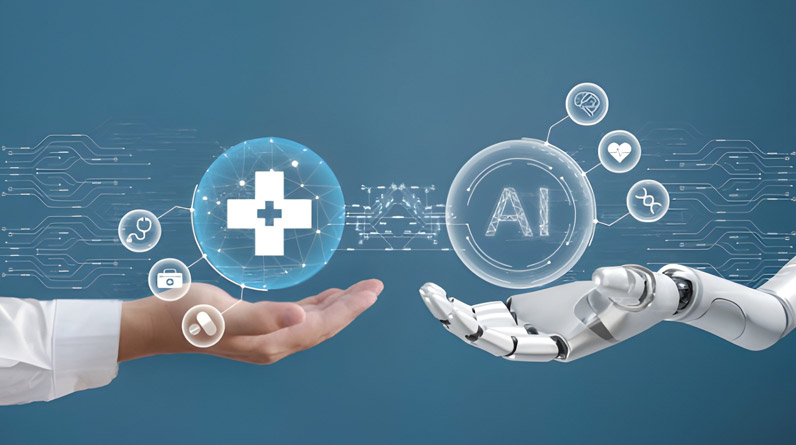Artificial intelligence is no longer a distant dream confined to science fiction novels. Today, it’s actively saving lives in hospitals, clinics, and research laboratories worldwide. According to recent research, AI has the potential to reduce healthcare errors by 86% and save over 250,000 lives annually. But how exactly is this technology transforming medicine, and what does it mean for patients, doctors, and the future of healthcare?
This article explores the multifaceted ways AI is revolutionizing healthcare delivery, from early disease detection to personalized treatment plans, while examining the critical challenges that healthcare professionals must address before widespread adoption.
The AI Revolution in Healthcare: Numbers That Speak
The healthcare industry is experiencing unprecedented transformation. Consider these compelling statistics:
- $188 billion market value projected by 2030 (Statista)
- 94% of healthcare businesses already utilize AI or machine learning (Morgan Stanley Research)
- 250,000+ lives could be saved annually through error reduction
- 44% reduction in radiologist workload with AI assistance (Swedish breast cancer study, The Lancet Oncology)
- 20% increase in cancer detection rates without increasing false positives
These numbers underscore a fundamental shift: AI isn’t just improving healthcare efficiency—it’s actively extending and saving lives on a massive scale.
1. Early Disease Detection: The Game-Changer Healthcare Needed
Beyond Human Limitations
Traditionally, medical diagnosis relies on human expertise, intuition, and pattern recognition. However, the human eye has limitations. A radiologist might examine hundreds of medical images daily, and subtle abnormalities can be missed due to fatigue or the complexity of visual analysis.
AI changes this equation entirely. AI-powered diagnostic systems can analyze thousands of medical images and patient data within seconds, spotting patterns completely invisible to the human eye.
Real-World Applications
| Disease/Condition | AI Application | Outcome |
|---|---|---|
| Breast Cancer | AI-enhanced mammography analysis | 20% more cases detected; 44% reduced radiologist workload |
| Colorectal Cancer | Real-time colonoscopy scanning | Automatic identification of precancerous polyps |
| Diabetic Retinopathy | Deep learning eye scan analysis | Early detection preventing vision loss |
| Heart Disease | ECG pattern analysis | Detection of asymptomatic cardiac conditions |
| Skin Cancer | Lesion classification algorithms | Identification of malignant melanomas |
These applications demonstrate AI’s capacity to catch diseases at their earliest, most treatable stages—fundamentally changing patient outcomes.
2. Personalized Medicine: Tailoring Treatment to Individual Patients
Moving Beyond One-Size-Fits-All Healthcare
For decades, medicine followed a standardized approach: patients with similar diagnoses received similar treatments. Today, AI is dismantling this outdated model by enabling truly personalized healthcare.
By analyzing a patient’s unique genetic makeup, lifestyle habits, medical history, and even demographic factors, AI systems create customized treatment plans that maximize efficacy and minimize side effects.
Pharmacogenomics: The Future of Drug Selection
AI leverages genomic data to predict how individual patients will respond to specific medications. Rather than relying on trial-and-error drug selection, physicians can now determine optimal medications and dosages before treatment begins. This approach is particularly transformative in cancer treatment, where AI recommends specific drug combinations based on a patient’s unique genetic profile.
Result: Increased recovery rates and dramatically reduced adverse drug reactions.
3. Accelerating Drug Discovery: From Years to Months
The Traditional Problem
Developing new pharmaceuticals has historically been a 10-15 year process costing billions of dollars. Researchers manually screen countless compounds, test molecular interactions, and conduct extensive trials—a process fraught with delays and inefficiencies.
AI’s Solution
AI-powered drug discovery dramatically compresses this timeline by:
- Analyzing massive biological datasets to identify promising drug candidates
- Predicting molecular interactions with target proteins before lab testing
- Virtual screening of compounds eliminating costly, time-consuming preliminary testing
- Optimizing clinical trial design to identify suitable participants faster
The COVID-19 pandemic provided compelling proof: AI accelerated vaccine research dramatically, compressing what typically takes years into months. This capability could reduce pharmaceutical production costs by over $70 billion by 2028, making life-saving medications more accessible globally.
4. Operational Efficiency: Transforming Healthcare Administration
The Administrative Burden Hospitals Face
Ironically, despite medical professionals’ desire to focus on patient care, they spend enormous time on administrative tasks: documentation, scheduling, billing, and insurance processing. This diverts crucial attention from patient interaction.
AI’s Administrative Revolution
AI automates these time-consuming processes through:
- Automated medical documentation: AI transcribes patient conversations and generates clinical notes in real-time, reducing physician paperwork by hours daily
- Intelligent scheduling: Optimizes appointment booking, reducing wait times and maximizing resource utilization
- Automated billing and claims: Processes insurance claims faster while reducing errors
- Virtual patient assistants: Handle routine inquiries, appointment reminders, and medication scheduling
The impact? Healthcare professionals reclaim time for what matters most: direct patient care. Hospitals reduce operational costs while improving patient satisfaction.
5. Remote Monitoring: Healthcare Delivered Home
The Power of Continuous Surveillance
AI-powered wearables and monitoring devices enable unprecedented real-time health tracking. From smartwatch heart rate monitors to implantable glucose trackers, these devices generate continuous data streams that healthcare providers monitor remotely.
Concrete Benefits
For chronic disease management: Patients with diabetes, hypertension, or cardiac conditions receive continuous monitoring that alerts providers to dangerous fluctuations before emergencies occur.
For hospital readmissions: By monitoring patients at home instead of requiring repeated hospital visits, AI-driven systems reduce costly readmissions while improving patient quality of life.
For ICU care: Intelligent Intensive Care Units employ AI to monitor vital signs continuously, alerting staff to deteriorating conditions instantly—potentially the difference between life and death in critical moments.
6. The Human-AI Partnership: The Fresh Perspective Healthcare Needs

AI Augments, It Doesn’t Replace
A critical misconception surrounds AI in healthcare: the fear that it will replace medical professionals. Research and expert consensus suggest otherwise.
Rather than replacing doctors, AI empowers them. AI functions as an intelligent colleague—handling pattern recognition and data analysis while physicians provide clinical judgment, ethical reasoning, and human compassion.
The Synergy That Saves Lives
Consider how this partnership works in practice:
A radiologist reviewing chest X-rays uses AI to flag suspicious areas. The AI’s pattern recognition identifies anomalies invisible to human observation. However, the radiologist makes the final diagnosis, contextualizing findings within the patient’s complete clinical picture. The radiologist orders follow-up tests, discusses results with patients, and explains treatment options—uniquely human responsibilities.
This collaboration model maximizes both human and machine strengths while maintaining accountability and ethical responsibility in healthcare delivery.
7. Critical Challenges: The Obstacles Healthcare Must Navigate
Data Bias: AI’s Achilles Heel
AI models trained on biased or incomplete datasets perpetuate healthcare disparities. If a heart disease prediction model was trained primarily on older white men, it may not accurately predict disease in women or patients of different ethnicities.
This challenge demands rigorous attention. Healthcare institutions must ensure:
- Training datasets are representative of diverse populations
- Algorithm performance is validated across demographic groups
- Continuous monitoring for performance degradation over time
Data Privacy and Security
AI requires access to massive amounts of sensitive patient data. Robust cybersecurity protocols and HIPAA compliance are non-negotiable. A single data breach could compromise millions of patients’ confidential medical information.
Validation and Clinical Implementation
Despite promising research, AI tools must undergo rigorous validation before clinical deployment. As one Harvard Medical School researcher emphasized, “We have to be cautious and assure robust validation and rigorous implementation.” Early-stage discoveries don’t automatically translate to safe, effective clinical use.
Cost and Integration
Implementing AI requires substantial capital investment and integration with legacy healthcare systems—a significant barrier for smaller institutions and healthcare systems in developing countries.
8. The Market Transformation and What It Means
The healthcare AI market is experiencing explosive growth. Healthcare sectors positioning themselves for growth include:
- Biopharma and drug development
- Diagnostics and medical imaging
- Healthcare services and delivery
- Medical device manufacturing
This expansion creates opportunities for innovation while highlighting the urgent need for ethical frameworks and regulatory clarity.
Conclusion: The Future Is Now, But Carefully
Artificial intelligence is unquestionably transforming healthcare in profound ways. The potential to save 250,000 lives annually, accelerate drug discovery, and democratize access to world-class diagnostics represents medicine’s most significant advancement in decades.
However, this transformation requires careful navigation. Success depends on addressing bias, ensuring robust validation, protecting patient privacy, and maintaining the human expertise and compassion that define healthcare at its best.
As healthcare professionals and technologists work collaboratively to refine AI applications, one truth becomes increasingly clear: the future of medicine belongs not to AI alone, nor to human expertise alone, but to the powerful synergy between them.
The question is no longer whether AI will transform healthcare—it already has. The real question is how quickly and equitably we can scale these life-saving technologies to benefit patients globally.


